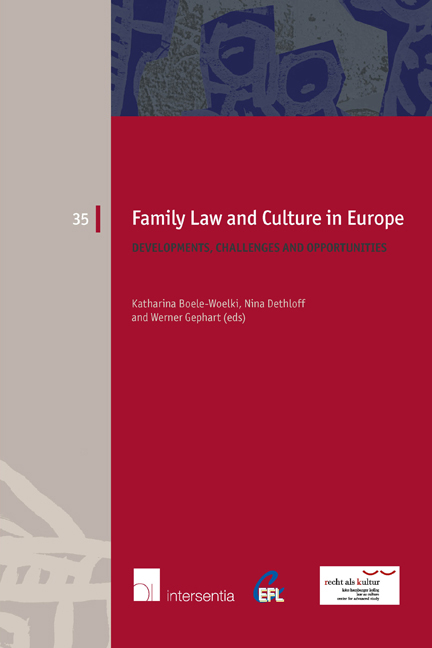Book contents
- Frontmatter
- Preface
- Contents
- List of Authors
- PART ONE THE CEFL PRINCIPLES ON PROPERTY RELATIONS BETWEEN SPOUSES
- PART TWO BREAKUP OF (NON-)FORMALISED RELATIONSHIPS
- PART THREE NEW CONCEPTS OF PARENTAGE
- PART FOUR INTERNATIONAL FAMILY RELATIONSHIPS
- PART FIVE TRANSNATIONAL FAMILIES: ACROSS NATIONS AND CULTURES
- EUROPEAN FAMILY LAW SERIES
Preface
Published online by Cambridge University Press: 22 November 2017
- Frontmatter
- Preface
- Contents
- List of Authors
- PART ONE THE CEFL PRINCIPLES ON PROPERTY RELATIONS BETWEEN SPOUSES
- PART TWO BREAKUP OF (NON-)FORMALISED RELATIONSHIPS
- PART THREE NEW CONCEPTS OF PARENTAGE
- PART FOUR INTERNATIONAL FAMILY RELATIONSHIPS
- PART FIVE TRANSNATIONAL FAMILIES: ACROSS NATIONS AND CULTURES
- EUROPEAN FAMILY LAW SERIES
Summary
The fifth conference of the Commission on European Family Law (CEFL) on ‘Family Law and Culture in Europe: Developments, Challenges and Opportunities’ was held in Bonn in August 2013 in collaboration with the University of Bonn and the Käte Hamburger Center for Advanced Study in the Humanities ‘Law as Culture’, which aims to contribute to an understanding of the cultural dimension of law and the promotion of the research on law from the perspective of the humanities. The participation of more than 200 participants from around 33 countries made the conference a valuable experience and fostered a stimulating discussion during the three conference days.
The discussions were introduced by eminent conference speakers from all over Europe. Additionally, twelve young researchers from eight different countries were selected after a call for papers. They presented their research in four parallel working groups which addressed Cross-Border Family Relationships, Transnational Families, The (Un-)Wanted Child, and the Relationship Breakup. Their papers are also included in this volume.
The book consists of five parts. It starts with four presentations of the CEFL Principles on Property Relations between Spouses. Part 2 examines the breakup of (non-)formalized relationships with special reference to unmarried cohabitation and the current debate on its legislation. It also addresses alternative instruments of conflict resolution in family law like the Irish collaborative law approach. Part 3 analyses the interdependence between legal, social and biological parenthood. It also deals with the problems of cross-border surrogacy as well as mechanisms for the anonymous relinquishment of children and baby boxes. It ends with a contribution on legal issues concerning stepfamilies. Part 4 addresses the legal aspects on international family relationships and contains a critical view on the 2011 Proposal for a Regulation on jurisdiction, applicable law and the recognition and enforcement of decisions in matters of matrimonial property regimes. It also analyses the notion of ‘habitual residence’ in European family law and refers to the criteria of nationality and domicile as a connecting factor for private international law questions regarding same-sex relationships. Finally, Part 5 reveals interesting aspects of transnational families such as the EU citizenship.
- Type
- Chapter
- Information
- Family Law and Culture in EuropeDevelopments, Challenges and Opportunities, pp. v - viPublisher: IntersentiaPrint publication year: 2014



